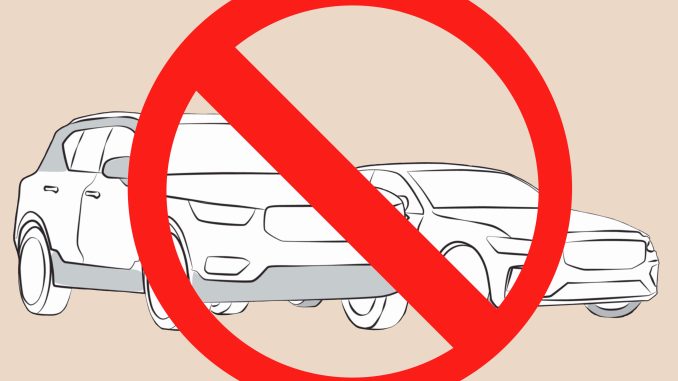
Shea Stevenson
Take a step back and think of how insane it is that anyone has a car at all. Separate it from a culture of cars, just look at the object. It’s a multi-ton engineering marvel, massive, luxurious even when cheap (made from steel, leather, complex machinery, glass), and piloted only by trained individuals. And there are so many of them!
There aren’t many things that Americans like more than their cars, even after guns have become an American division. Practically everyone agrees that it’s their right to be able to own their huge car, which makes sense, as for most people it’s an extension of themselves. Much like owning a gun, it’s not just an object, but something that fundamentally changes how you see and interact with the world. With a car comes total entitlement to the roads, a sense of freedom therein, and an ability to abscond from any situation at any time. “Person with car” is philosophically a totally different animal to just “person.”
What interests me most in those characteristics is the entitlement to the roads. Because the others are just things that cars can do, but the entitlement to the road itself – cars being the de-facto users of roads and all other modes of transport being secondary to them – is particularly recent and constructed.
Like, what? Why?
On the face of it, that’s a strange thing for an entire society to accept as true, given that roads are a big chunk of all land we have, especially in urban spaces. In the city, from the perspective of the driver, all pedestrians and bikers are annoyances on their path and the law largely agrees with them on this. I imagine some readers may have balked at the equivocation between cars and guns, likely because such a reader is a fan of cars and not a fan of guns, but it’s important to point out that cars are probably the single deadliest objects any of us own. As a driver, a biker is an annoyance. As a biker, a driver is a potential executioner if they don’t do their job right. This is normal, this is progress, this is just how it is.
It’s well known that the term “jay-walking” was invented by car companies in the 1930s to stigmatize pedestrian ownership of the road. After all, for as long as roads had existed up until that point, it wasn’t particularly dangerous to walk across them. But when cars were invented, they inevitably started killing people at a far higher rate than, say, horse-drawn carriages. So uh-oh, that’s a problem. Enter the political division between limiting the use of cars or radically expanding their use, both to the same theoretical effect of saving lives. Either cars are beholden to pedestrians, or we completely reinvent the roads and how people navigate them so that no one crosses the street unless we tell them they can. Terms like jay-walking were coined to sway public opinion and change the tone of conversation: you were wrong for walking around, you are at fault if you get hit. Later, it became law.
The truth of the American culture of cars is something like this: a handful of very wealthy white men in the 30s and 40s decided that cars would become the dominant means of transportation, because it fit their vision of a white suburban future for the country and the need to expand into new markets of growth (among other factors). So people like Robert Moses (incredibly powerful urban planner through the mid 20th century) tear through New York to build the expressways, doing so in ways that specifically prohibit the use of buses and replace or eliminate plans to expand the subways and metro lines. Seeing this makes New York City lots of money with investors, other cities in America take it as an example and follow suit.
This was the 1940s. Cars were not fully ubiquitous, especially not among non-wealthy urbanites. But it worked, as one may expect in hindsight. It feeds into so many American ideals: individual freedom, manifest destiny, consumerist identity-crafting, debt traps. It’s a scam the culture was custom made to fall for.
This isn’t all to say that I don’t want cars to exist, nor even that I want to regulate the use of cars and reinvest in, say, high speed rail (though that’s true). It only speaks to a lack of imagination, I find. That people think it’s impossible to shift the world away from cars. Not just for the environment, but more immediately for people who have to walk places, or for the advent of the nicer train lines that could be built and made free. Yet, like guns, people think of their cars as a part of themselves, and to take that away is to take away a part of their identity.
The neoliberal culture of “there is only the individual, no collective” is going to kill us some day, and it’ll be in some boring way that isn’t enough of an obvious kick back to give everyone a good fright into working together. I think a lot of people can’t imagine giving up that perceived personal freedom of a car in exchange for (an even nicer) robust public transportation.
Cars as we know them have been a big thing for around a hundred years, perhaps even less. They are not an objective mark of progress past trains or carriages, even if they have their advantages. The scam was to trick everyone into thinking this is a march of evolution and not a decision that someone made and others followed.
With time and complacency comes legitimacy. Consider imagining a cooler future.
